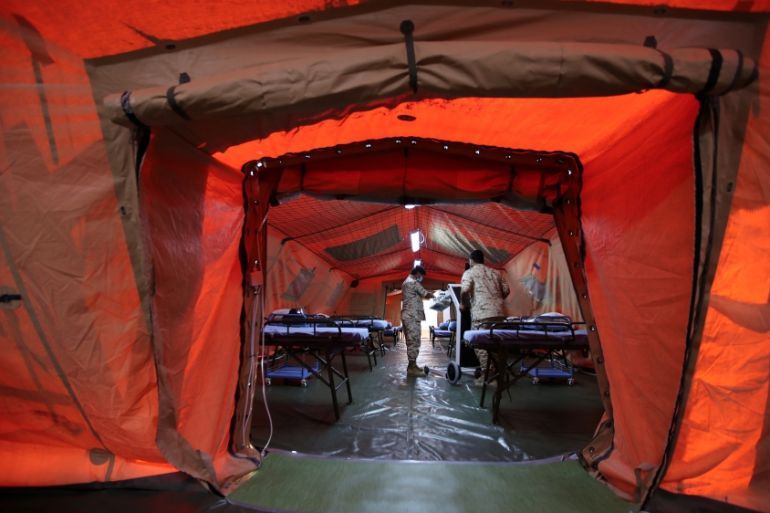Bahrain may need more financial aid from Gulf Arab states
Bahrain lacks the oil and financial resources of its neighbours, and its state finances are among the region’s weakest.

Bahrain may need more financial aid from fellow Gulf Arab states as soon as this year, but its wealthier neighbours could themselves be hamstrung by low oil prices and the economic impact of the new coronavirus, bankers and analysts said.
Bahrain, whose sovereign bonds have been rated junk by major credit rating agencies, in 2018 received a $10bn aid package over five years from Saudi Arabia, Kuwait and the United Arab Emirates to help it avoid a credit crunch in a deal tied to fiscal reform.
Keep reading
list of 3 itemsOman and Bahrain stuck on sidelines of sovereign debt markets
Bahrain in talks for $1bn loan after bond plans postponed
But the US-allied island state, a small oil producer, could need a larger amount than allotted for 2020 to fill bigger financing needs with petroleum prices at $20 to $30 a barrel.
Bahrain announced in March an $11bn stimulus package including plans to spend $570m on private-sector salaries to mitigate the impact of the coronavirus pandemic on the economy.
“Our estimates point to Bahrain needing additional funding in 2020 from the $10bn support package they got in 2018,” said Sara Grut, emerging market strategist at Goldman Sachs.
The finance ministry declined to comment about when it expects to receive this year’s tranche of the five-year $10bn aid, which would equal $1.76bn according to official plans announced last year.
Bahrain’s fiscal deficit is expected to jump to 15.7 percent of gross domestic product this year from 10.6 percent in 2019, according to the International Monetary Fund. Bahrain’s preliminary estimates in February forecast the 2019 deficit at 4.7 percent of GDP.
A debt banker in the Gulf said Bahrain’s financing gap would be “tiny”, especially with additional assistance, but that its neighbours’ support “might not be so forthcoming this time”.
Bahrain lacks the ample oil and financial resources of its neighbours, and its state finances are among the weakest in the region. But its Gulf Arab allies have provided political and economic support to maintain its stability over the years due to its importance in countering Iranian influence in the region.
Headquarters of the US Navy’s Fifth Fleet, Bahrain shares with Riyadh a concern about discontent among some Shia Muslims citizens against their ruling Sunni dynasties, and accuse Shia Iran of fomenting it – a charge Iran denies.
Toby Iles, a director at Fitch Ratings, said Bahrain’s “small size and strategic importance favour ongoing support” from Gulf allies, but Manama would need to use the remainder of the package more quickly.
On the fence
The finance ministry said fiscal measures, including a 30 percent reduction in ministries’ administrative budgets and postponing large-scale infrastructure projects, would “ensure government spending remains within the budget ceiling” for 2020.
Bahrain plans to issue international bonds twice this year, the ministry said in an emailed statement to Reuters.
Manama secured a loan of about $1bn to repay a $1.25bn bond due at the end of March, banking sources had told Reuters, after suspending plans to issue international bonds as market conditions worsened.
But it had to rely on local banks to get the deal done, two banking sources said. “International banks that would normally lend to Bahrain were sitting on the fence for this one,” said one of them.
With $3.4bn in central bank foreign reserves as of the end of February, some are questioning Bahrain’s ability to defend its currency peg to the US dollar.
“I have seen some recommendations to short the Saudi riyal, but more obvious ones in the region I guess would be the Omani rial and the Bahraini dinar,” Tim Ash, emerging markets senior sovereign strategist at BlueBay Asset Management, said in an emailed comment to contacts last month.
Yields of Bahrain’s dollar bonds due in 2047 have risen sharply by some 180 basis points since the beginning of March.
Manama’s foreign reserves are likely to be insufficient to absorb the deterioration in its current account if oil stays around $30 this year, Goldman Sachs said in a research note.
“Bahrain has already done reforms, so what room realistically is left?” asked a Dubai-based fund manager, referring to subsidy cuts and introduction of value-added tax under a programme to achieve budget balance by 2022.
It would all come down to oil prices, he said, noting, “If it stays at $20 I think you can forget all about [Gulf] support.”